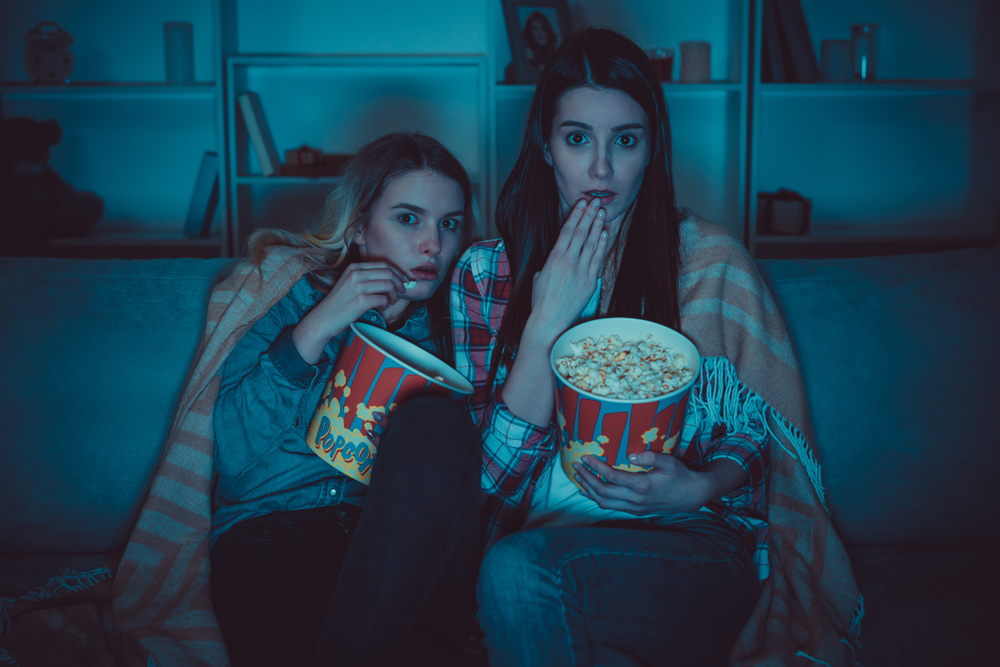The mere mention of legendary horror films such as “The Exorcist” and “Silent Night, Deadly Night” conjures up images of terror and revulsion. But did you know that, despite making spectators squirm and cringe, some films may be beneficial to their mental health? In this investigation, we look into the physics and psychology behind the strange benefits of watching horror films.
Horror’s terrifying allure
Horror films have traditionally fascinated audiences with their capacity to both frighten and excite. While it may appear paradoxical, researchers feel that watching horror films might be beneficial to one’s mental health. “There’s some research on this in psychology, but I think what’s basically been found is that there’s a benefit to rehearsing fears in your mind,” says Matthew Strohl, a philosophy professor at the University of Montana. Confronting concerns in a fictitious setting might create a sense of control over them.
Learning from the experience of others
Frank T. McAndrew, a Knox College psychology professor who in the past studied how places can “creep” people out, now investigates the evolutionary component of human affinity with terror. He observes that individuals are hardwired to learn from the experiences of others, and horror films provide a platform for mentally practicing coping skills with unpleasant events. We prepare for similar real-life obstacles by observing how characters deal with terrible situations while keeping a sense of distance and control.
Savoring the emotional high
The appeal of horror films extends beyond education and preparation. McAndrew notes that the emotional rollercoaster that these films provide is a major allure. The adrenaline rush, excitement, and quick heartbeat create a distinct type of enjoyment. “You come out of there with the same feeling we have on amusement park rides,” he said.
The three kinds of horror fans
Aarhus University assistant professor Mathias Clasen researched the psychology of horror movie lovers and identified three main groups. First, there’s the “adrenaline junkie” who enjoys the physiological excitation provided by horror films. Following that is the “white knuckler,” who may not love overstimulating himself but watches horror films as a personal challenge, frequently gaining useful truths about themselves. Finally, there is the “dark coper,” who watches horror films as a way of coping and even as a type of treatment for anxiety and despair.
Clasen and colleagues investigated the link between watching scary movies and mental health during the early stages of the COVID-19 pandemic. The study wanted to see if people who watched scary movies had higher levels of psychological resilience. What they discovered was intriguing. Emotions were actively modulated when participants engaged in “recreational fear activities,” such as watching horror movies. This fun interaction with fear improved emotion control skills, allowing participants to deal with stress and anxiety more successfully.
A peek at the real world
The advantages of watching horror films go beyond the screen. According to Clasen, as you traverse the realm of cinematic dread, you learn skills for dealing with fear, tension, and anxiety in real-life situations. Whether you’re turning down the volume, covering your eyes, or reminding yourself that it’s only a movie, these techniques improve your ability to control emotions, allowing you to remain calm and resilient in the face of real-life obstacles. This idea is supported by results from the COVID-19 lockdown: individuals who viewed more scary movies displayed better control over stress, fear, and anxiety.
Horror films have long enjoyed a special place in the world of cinema, simultaneously enthralling and horrifying audiences. While the visceral sensations they elicit may lead one to feel they are harmful to one’s mental health, evidence says otherwise. Horror films provide a variety of psychological benefits, ranging from learning to regulate fear to enjoying an emotional rush. So, the next time you’re immersed in a scary movie, keep in mind that you might be doing your mental health a favor by embracing the dread on the screen.











